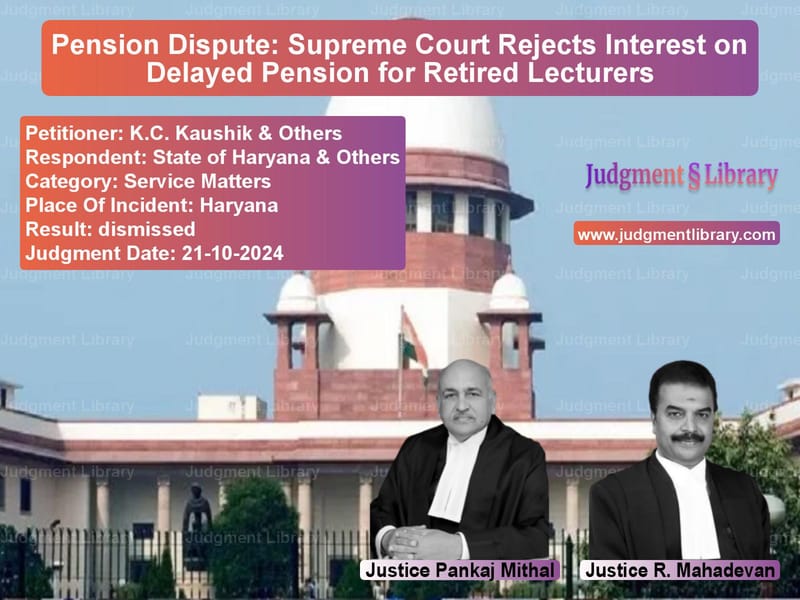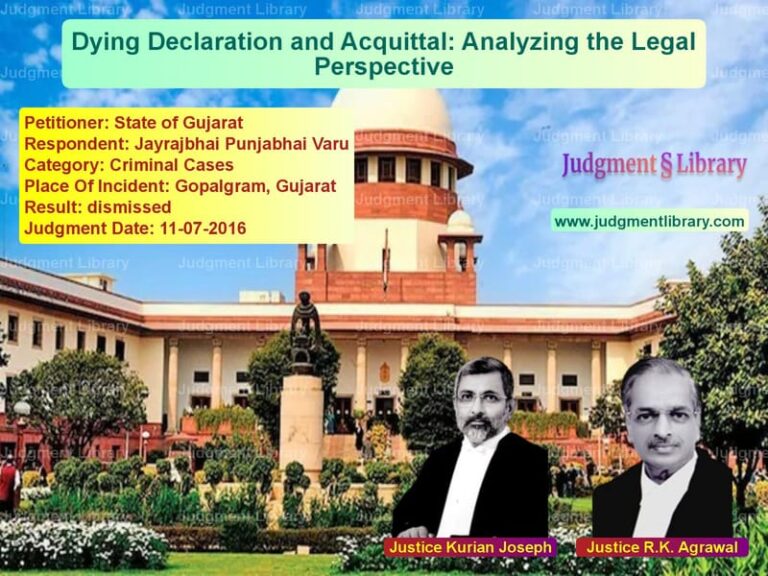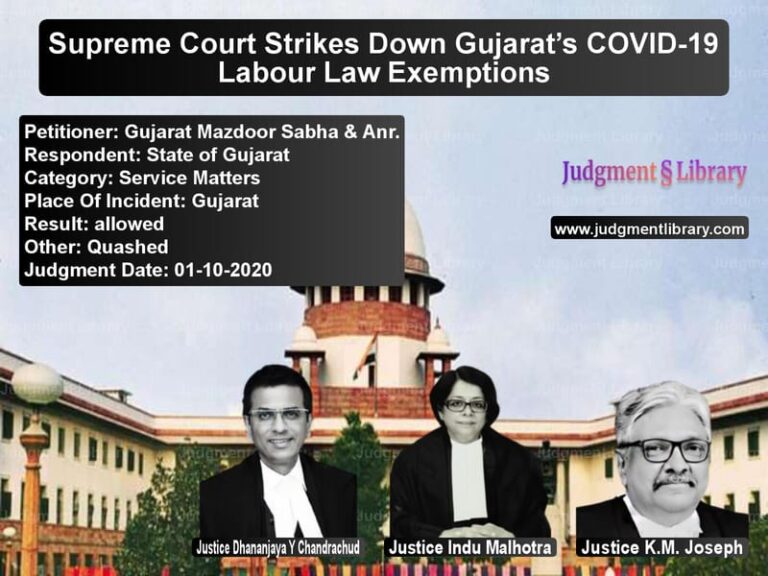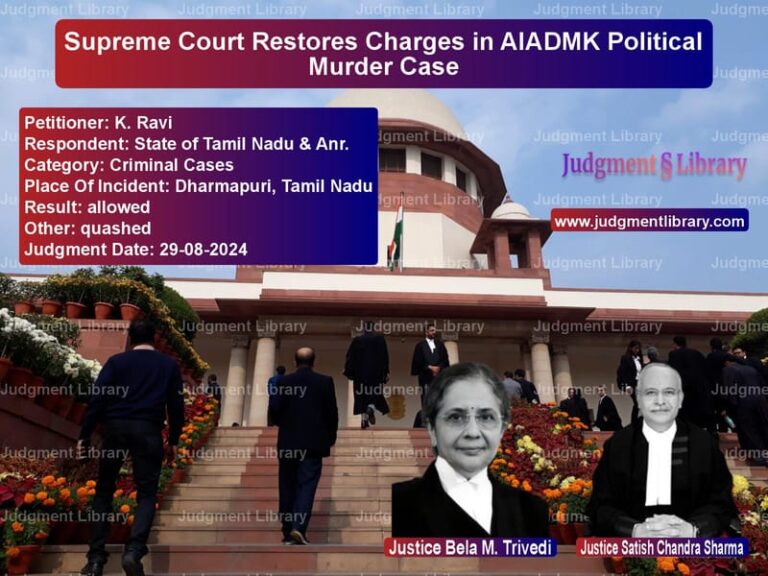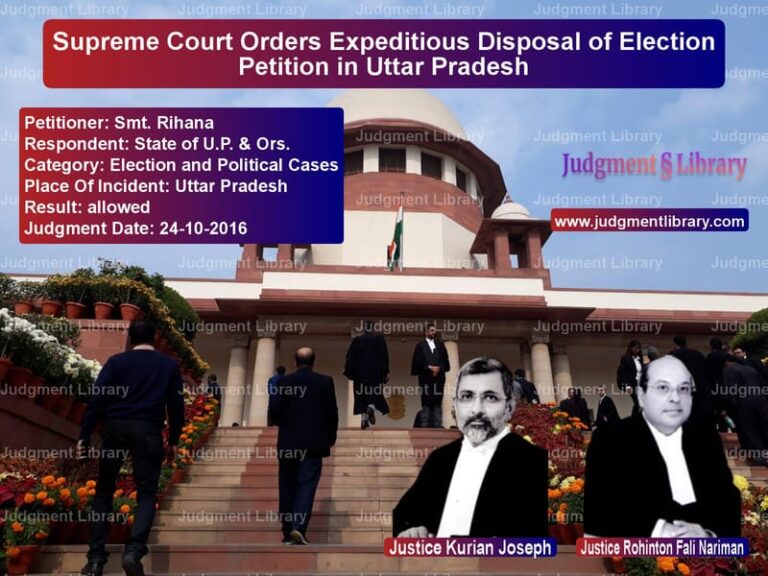Pension Dispute: Supreme Court Rejects Interest on Delayed Pension for Retired Lecturers
The case of K.C. Kaushik & Others vs. State of Haryana revolved around a legal battle between retired lecturers and the Haryana government regarding the payment of revised pensions. The Supreme Court had to determine whether the petitioners were entitled to interest on the delayed payment of their revised pensions. Ultimately, the Court ruled against the petitioners, emphasizing that they were ‘fence-sitters’ who had only approached the court after other litigants had successfully secured their benefits.
Background of the Case
The appellants, including K.C. Kaushik, K.R. Malik, Inderjeet Bharti, and Savitri Malik, were retired Lecturers and Principals of Government-Aided Private Colleges in Haryana. They challenged the Haryana government’s decision to deny them a revised pension similar to that of retired lecturers in Government Colleges. The key details of the case are as follows:
- The Haryana government issued the Haryana Civil Services (Revised Pension) Rules, 2009, which revised pension scales for government employees, effective from January 1, 2006.
- Initially, the state government excluded retired lecturers from aided private colleges from this pension revision.
- In 2010, a group of government college lecturers challenged the exclusion, leading to a Punjab & Haryana High Court ruling in their favor in 2012.
- The government implemented the ruling in 2014, revising pensions for government college lecturers but not for private aided college retirees.
- The appellants filed writ petitions in 2015 seeking parity with government college lecturers.
- During the hearings, the state agreed to extend the revised pension to them as well, and the High Court dismissed the petitions as withdrawn.
- The issue of interest on the delayed payment of pension remained unresolved, leading to further litigation.
Legal Issues Considered
- Were the petitioners entitled to interest on the delayed payment of revised pensions?
- Did the state government make a binding commitment in court to pay interest?
- Should the petitioners be treated differently from the original litigants who secured revised pensions earlier?
Petitioners’ Arguments
The appellants, represented by senior counsel, argued:
- The state government had verbally committed in the High Court that interest would be paid.
- The delay in revising their pensions was not their fault, and natural justice demanded compensation in the form of interest.
- Similar claims had been granted to government college lecturers, and denying interest to them created an unjust distinction.
- The state had taken contradictory positions, at times agreeing to pay interest and later refusing it.
Respondent’s Arguments
The Haryana government contended:
- The petitioners were ‘fence-sitters’ who did not actively litigate their claims until others had succeeded.
- There was no provision under the 2009 Pension Rules that mandated interest for delayed payments.
- The revised pay scales were implemented retrospectively but did not carry an automatic right to interest.
- Oral assurances made in court were not binding since they were not backed by formal government approval.
- Other similarly placed employees who received pension arrears did not get interest, so awarding interest here would create an unfair advantage.
Supreme Court’s Observations
1. No Automatic Right to Interest
The Court held that the Haryana Civil Services (Revised Pension) Rules, 2009, did not contain any provision for the payment of interest on arrears:
“Rule 6 of the Rules, 2009, specifically deals with the case of Retired Government employees, and there is no provision in the Rules, 2009, to award interest for any belated payment.”
2. The Petitioners Were ‘Fence-Sitters’
The Court criticized the petitioners for not actively pursuing their claims until others had successfully secured relief:
“The appellants waited till the rights of the retired employees of the Government Colleges were crystalized and thereafter made representation. They cannot be treated as litigants who fought for their rights from the beginning.”
3. No Formal Commitment to Pay Interest
Regarding the state’s alleged commitment to pay interest, the Court ruled:
“There was no written instruction furnished by the State, and the learned Single Judge passed the orders only based on the concessions made on behalf of the State.”
4. Fairness and Equitable Treatment
The Court emphasized that other similarly placed retirees had also received revised pensions without interest and awarding interest in this case would create an unjustified disparity:
“The petitioners sought parity with the government college lecturers but wanted additional benefits in the form of interest, which the original litigants never received.”
Final Judgment
The Supreme Court ruled:
- The appeals were dismissed, and no interest would be awarded.
- The revised pensions paid to the appellants were lawful, but the demand for interest was unfounded.
- The government’s oral statements in the High Court were not legally binding.
- Litigants must actively pursue their claims instead of waiting for others to secure favorable judgments before taking action.
Conclusion
The Supreme Court’s ruling in K.C. Kaushik & Others vs. State of Haryana underscores key legal principles:
- Government policies on revised pensions do not automatically grant interest on arrears.
- Litigants who delay legal action cannot expect the same benefits as those who fought from the outset.
- Oral commitments in court by government representatives do not override formal policy decisions.
- Equitable treatment must be maintained between different groups of retirees.
This judgment reinforces the importance of timely legal action and ensures that pension revisions are implemented fairly, without unnecessary financial burdens on the government.
Petitioner Name: K.C. Kaushik & Others.Respondent Name: State of Haryana & Others.Judgment By: Justice Pankaj Mithal, Justice R. Mahadevan.Place Of Incident: Haryana.Judgment Date: 21-10-2024.
Don’t miss out on the full details! Download the complete judgment in PDF format below and gain valuable insights instantly!
Download Judgment: k.c.-kaushik-&-other-vs-state-of-haryana-&-o-supreme-court-of-india-judgment-dated-21-10-2024.pdf
Directly Download Judgment: Directly download this Judgment
See all petitions in Pension and Gratuity
See all petitions in Public Sector Employees
See all petitions in Employment Disputes
See all petitions in Termination Cases
See all petitions in Judgment by Pankaj Mithal
See all petitions in Judgment by R. Mahadevan
See all petitions in dismissed
See all petitions in supreme court of India judgments October 2024
See all petitions in 2024 judgments
See all posts in Service Matters Category
See all allowed petitions in Service Matters Category
See all Dismissed petitions in Service Matters Category
See all partially allowed petitions in Service Matters Category

